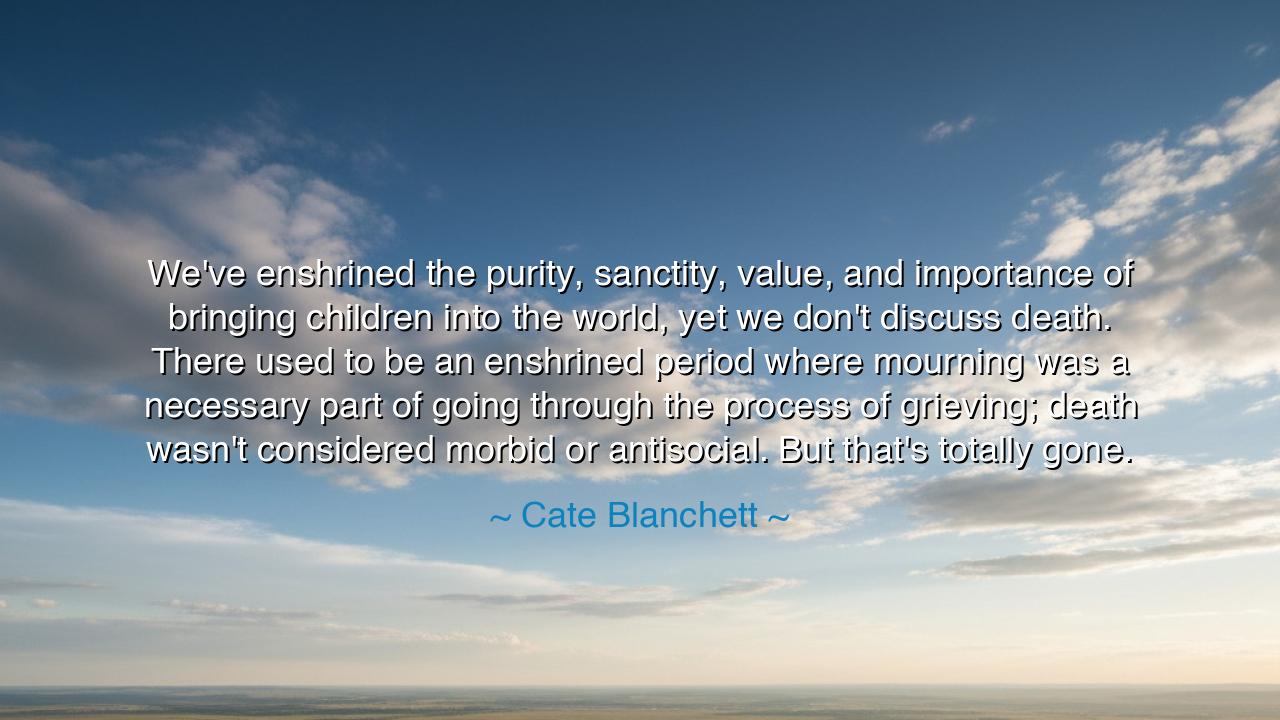
We've enshrined the purity, sanctity, value, and importance of
We've enshrined the purity, sanctity, value, and importance of bringing children into the world, yet we don't discuss death. There used to be an enshrined period where mourning was a necessary part of going through the process of grieving; death wasn't considered morbid or antisocial. But that's totally gone.






The words of Cate Blanchett, when she said, “We’ve enshrined the purity, sanctity, value, and importance of bringing children into the world, yet we don’t discuss death. There used to be an enshrined period where mourning was a necessary part of going through the process of grieving; death wasn’t considered morbid or antisocial. But that’s totally gone,” strike like the toll of a bell at dusk — solemn, resonant, and filled with forgotten truth. They call upon us to remember what our age has cast aside: the sacredness not only of birth, but of death, and the holy work of mourning that bridges the two.
In these words, Blanchett laments the modern silence surrounding death. We have built shrines to beginnings but none to endings; we celebrate the first cry of life yet turn away from the final breath. Our ancestors, wise in their simplicity, understood that death is not the opposite of life, but its companion. To them, to mourn was not weakness, nor was grief shameful — it was a ritual of remembrance, a gateway through which the soul of the living and the spirit of the departed might meet in reverence. Now, in our haste and discomfort, we hide death behind closed doors, disguising sorrow with distractions, and pretending endurance is the same as healing.
Once, in the villages of old Europe, when a soul departed, the whole community paused. Curtains were drawn, candles burned, and families wore black — not as a mark of despair, but as a visible declaration of love, of reverence for the mystery that had just unfolded. The bereaved were given time to mourn, time to weep, time to speak to the shadows that remained. Such mourning was a sacred duty, a healing fire that purified the heart. In that stillness, people learned that love, even in loss, does not end — it transforms. But now, we rush forward as if speed could protect us from sorrow. We deny death and thus deny life itself.
Think of the story of Queen Victoria, who, after the death of her beloved Albert, wore mourning black for the rest of her days. Though mocked by some as excessive, she embodied the ancient understanding that grief is not meant to be rushed. Her mourning became a monument of devotion — a way of saying that love endures even when the beloved does not. She did not fear the memory of death; she honored it. And in that act, she taught her nation that grief, when faced with dignity, becomes not a burden but a teacher.
Blanchett’s reflection speaks, then, to a loss of ritual, the absence of a shared space for grief. When death was part of life’s rhythm, people lived more wisely. They spoke softly of impermanence, they cherished each day, and they saw beauty even in decay. The ancients carved skulls upon their temples not to frighten, but to remind — that to live with death in sight is to live with meaning. To forget death, as we have done, is to drift through existence like a dreamer who fears awakening.
And yet, this quote is not despairing; it is a summons to remember. It urges us to reclaim the sacred conversation about endings, to restore mourning to its rightful place in the human heart. We must once again allow ourselves to weep openly, to gather in silence, to tell stories of the departed and feel their presence not as ghosts, but as echoes of love. For grief, when shared, becomes communion — a bridge between the living and the lost.
The lesson, then, is clear: speak of death, for in speaking of it, you honor life. Make space for grief — your own and others’. Do not rush to “move on,” but sit with the ache until it softens into wisdom. Light candles for those who have gone; whisper their names so they are not forgotten. Build rituals of remembrance, whether through prayer, art, or quiet reflection. For in acknowledging death, we reclaim our wholeness — and in mourning, we discover the fierce, unbreakable truth of love.
Thus, as the ancients would say: remember that all things pass, yet nothing truly ends. To live well is to die wisely; to mourn deeply is to love fully. Do not fear the final act of the play, for it is written by the same divine hand that penned the dawn. Embrace both birth and death as sacred notes in the same eternal song — and let the music of your life be played in full, without silence, without denial, but with reverence for the mystery that binds us all.






AAdministratorAdministrator
Welcome, honored guests. Please leave a comment, we will respond soon